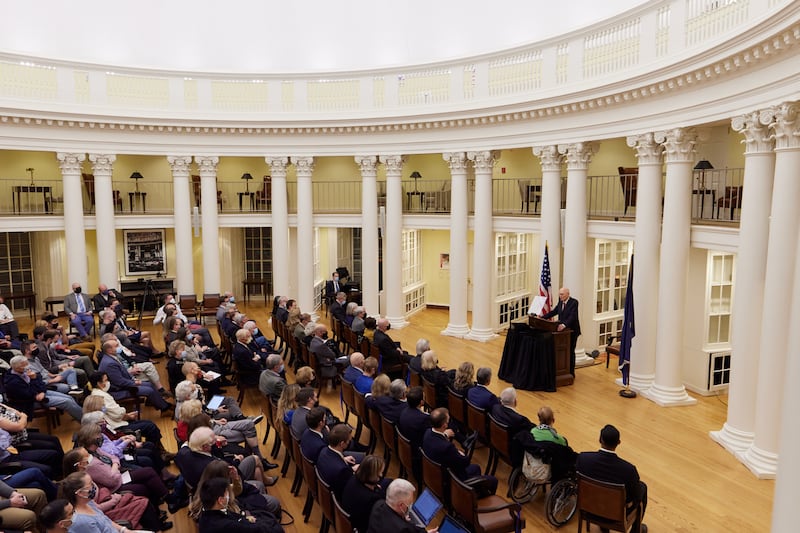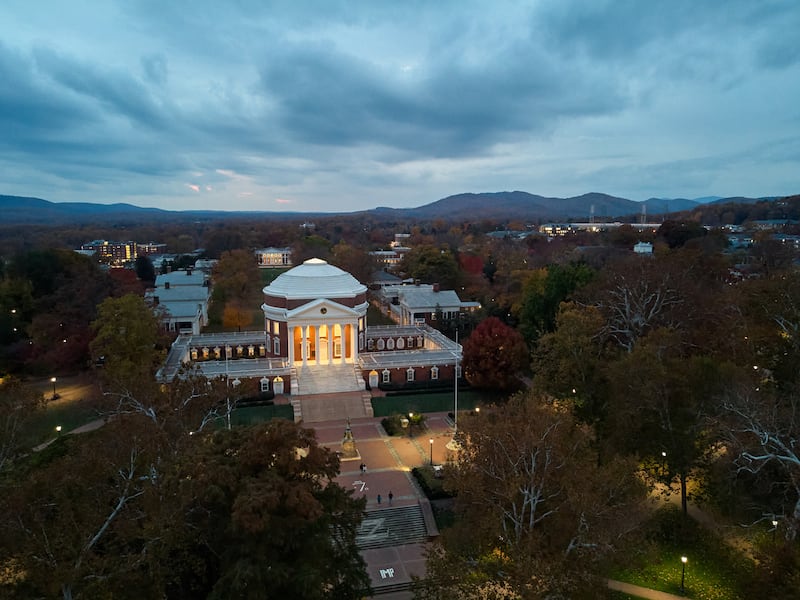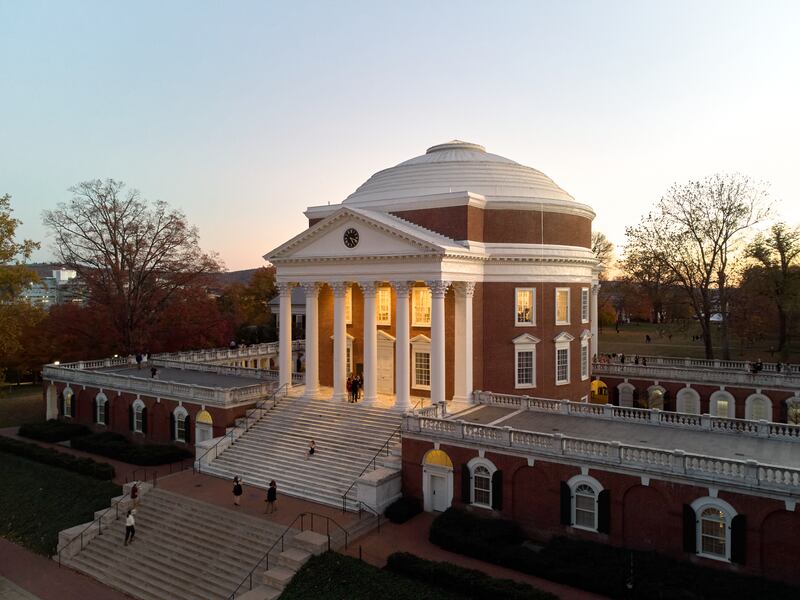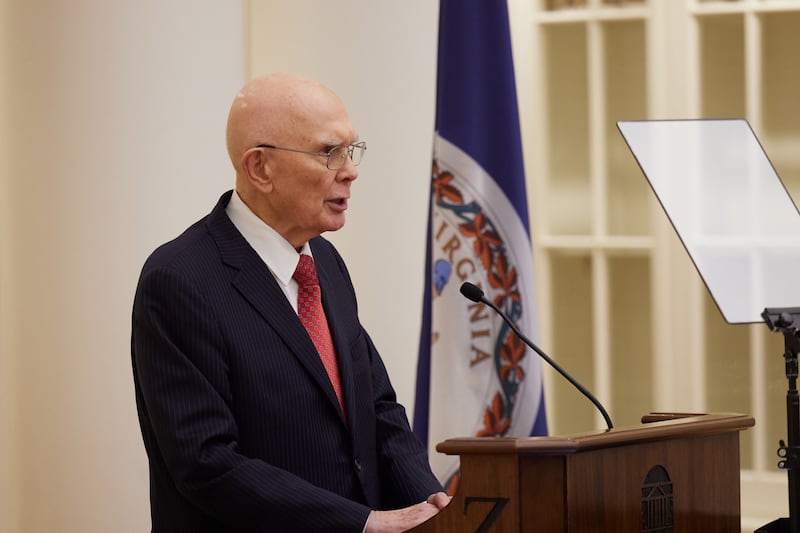A senior American faith leader said Friday during a landmark address at the University of Virginia that the nation’s believers should respect legal efforts to protect people from discrimination as much as they desire to protect religious liberty.
The best way to resolve “the current conflict between two great values” is to seek public policy solutions that protect both, said President Dallin H. Oaks, first counselor in the First Presidency of The Church of Jesus Christ of Latter-day Saints.
“We must not allow fears about losing our own freedoms make us insensitive to others’ claims for theirs,” he said in the Dome Room of the historic Rotunda on the campus of the University of Virginia. “Let us unite with those who advocate nondiscrimination to seek a culture and laws that respect the rights of all to the equal protection of the law and the right to the free exercise of religion.”
President Oaks, who said afterward that he was speaking for the First Presidency, reiterated the church’s fairness for all approach that gave birth to the Utah Compromise, which was signed into law in 2015. The law extended housing and employment protections to LGBTQ people while codifying protections for religious liberty.
“As a church, we are committed to the free exercise of religion to allow us to practice the principles of our faith,” he said. “But we are also committed to fundamental fairness and the rule of law. We see the process that succeeded in Utah as a promising way to have both religious protection and fundamental fairness.”
A federal Fairness for All Act inspired by the Utah Compromise is before the 117th Congress of the United States.
President Oaks expressed distress over the way issues are dividing the nation. He said he’s always known the tension believers feel when they are conflicted over their duties to God and to country.
“More recently,” he added, “I have come to understand better the distress of persons who feel that others are invoking constitutional rights like free exercise of religion and freedom of speech to deny or challenge their own core beliefs and their access to basic constitutional rights.
“I deeply regret that these two groups have been drawn into conflict with one another.”

He said that when there is genuine conflict between the two, “one constitutional right should not be invoked to try to cancel another constitutional right.”
A former Utah Supreme Court Justice, President Oaks said the U.S. Supreme Court’s 1948 wall between church and state is being selectively displaced and the tests the court established about the issues in a 1990 case are failing to reconcile opposing parties.
“Rather, it appears to have perpetuated, if not exacerbated, the divisiveness in our relationships,” he said. “It has become increasingly clear that we now need a new, workable balance between religious freedom and nondiscrimination.”
He did not directly mention the Fairness for All Act and during a question-and-answer session he said he was uncertain of its prospects, but he said it is a basic imperative that neither side should seek total dominance for its position.
“We should seek fairness for all,” President Oaks said. “Specifically, people of faith should not contest every nondiscrimination law or policy that could possibly impinge, however insignificantly, on institutional or individual religious freedom. Likewise, proponents of nondiscrimination need not contest every religious freedom exemption from nondiscrimination laws. The goals of both sides are best served by resolving differences through mutual respect, shared understanding and good faith negotiations. And both must accept and respect the rule of law.”

Tim Schultz, president of the First Amendment Project, said the Fairness for All Act has changed the conversation in Washington about how Congress can pass federal nondiscrimination legislation.
“The best evidence for what (President Oaks) is saying is the on-the-ground results in Utah,” he said. “There’s a widespread appreciation on all sides for the effects on the ground.”
The federal bill is the combined effort of many faith groups to improve on the Equality Act, a nondiscrimination bill that twice has passed the House but does not include any protections for religious liberty. The Fairness For All Act had eight sponsors when it first was introduced in the previous session of Congress. It now has 20.
Schultz predicted that a final bill would blend the two.
He also said he appreciated that President Oaks, as a religious leader, invited people of faith to recognize that religious liberty and nondiscrimination are not mutually exclusive, that believers can protect the rights of people with whom they disagree or feel are mistaken without retreating from their own religious beliefs.
“I think it’s really important for other faith groups to get that from what he says as a faith leader,” Schultz said.
President Oaks suggested both sides should pursue constructive politics rather than litigation, saying the courts “are ill-suited to the overarching, complex, and comprehensive policy-making that is required in a circumstance like the current conflict between two great values.”
That struck a chord with Nathan Oman, a law professor at William & Mary.
“What was really striking to me,” Oman said, “is the strong statements in favor of political compromise and legislative solutions rather than looking to the courts and looking to litigation to solve these things, and the idea that religious believers are going to have to give stuff up and can’t take absolutist positions.”
President Oaks specifically counseled against absolutism in these debates.
“We should also be wary of the idea that one set of rights automatically trumps another in all circumstances,” President Oaks said. “Both religious freedom and nondiscrimination are important values that are powerfully protected by law.”
Thomas Griffith, a former federal judge of the United States Court of Appeals for the District of Columbia Circuit, noted that President Oaks said in an April address to the international general conference of the Church of Jesus Christ that on contested issues, church members should seek to moderate and unify.
“That is a litmus test,” Griffith said. “And so I think he’s telling Latter-day Saints, ‘OK, is that you? Could that describe you on a contested issue? Is that what you’re seeking to do?”
In fact, on Friday night, President Oaks said that religious people should not only listen to advocates of nondiscrimination efforts but seek to understand them and then work to achieve harmony and peace by finding practical solutions to differences.
That does not require any compromise of core principles, he said.
“Far from being a weakness, reconciling adverse positions through respectful negotiation is a virtue,” President Oaks said. “As Jesus taught, ‘Blessed are the peacemakers: for they shall be called the children of God.’”
He provided examples from the history of The Church of Jesus Christ of Latter-day Saints that he said showed believers can seek fairness for all by mutual respect and willing accommodation.
“The right relationship between religious freedom and nondiscrimination is best achieved by respecting each other enough to negotiate in good faith and by caring for each other enough that the freedom and protection we seek is not for ourselves alone,” he said.
The Rotunda where President Oaks spoke was modeled by Thomas Jefferson after the Pantheon in Rome. It was during the first banquet in the Dome Room that the Marquis de Lafayette toasted Jefferson as the father of the University of Virginia.

Griffith said he didn’t think President Oaks’ theme for the seventh-annual Joseph Smith Lecture on Religious Liberty sponsored by the University of Virginia’s Mormon Studies program was a coincidence.
“Thomas Jefferson’s got plenty of problems, but Jefferson wrote the words that are the driving force of the American experiment,” Griffith said. “‘We hold these truths to be self-evident, that all people (all men) are created equal.’ That’s what this project is about, creating a society where there’s equality of opportunity, equal protection of the law.”
The full text of President Oaks’ lecture is available here.


